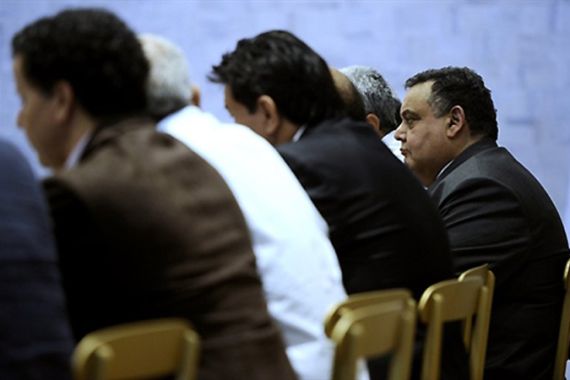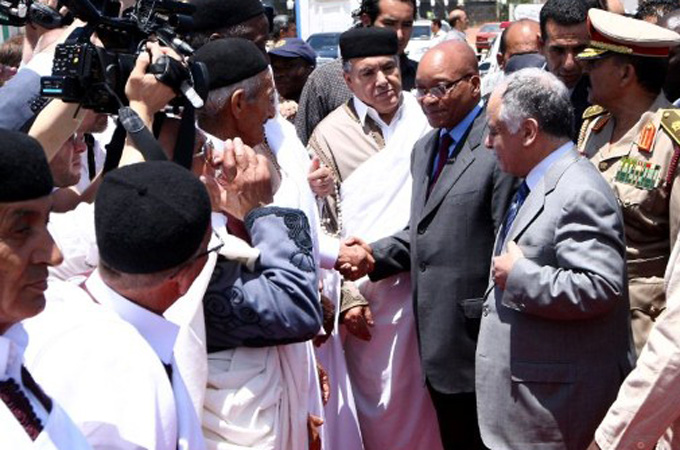‘Scores defect’ from Gaddafi’s army
Eight high-ranking officers and 120 military officials “abandon” armed forces amid growing pressure on Libyan leader.

 |
| Zuma’s office insists that his visit to Tripoli was to address political reform and humanitarian concerns [AFP] |
More than 100 military officials and soldiers have defected from Libya’s armed forces in recent days, according to a group of eight military officers, as pressure mounts on leader Muammar Gaddafi to step down.
The high-ranking Libyan army officers appeared at a press conference in Italy on Monday, where they announced that they were part of a group of as many as 120 military officials and soldiers who defected from Gaddafi’s side in recent days.
The hastily called news conference was organised by the Italian government for the the eight officers – five generals, two colonels and a major.
“What is happening to our people has frightened us,” said one officer, who identified himself as General Oun Ali Oun.
“There is a lot of killing, genocide … violence against women. No wise, rational person with the minimum of dignity can do what we saw with our eyes and what he asked us to do.”
Another officer, General Salah Giuma Yahmed, said Gaddafi’s army was weakening day by day, with the force reduced to 20 per cent of its original capacity.
“Gaddafi’s days are numbered,” said Yahmed.
Abdurrahman Shalgam, the Libyan UN ambassador, who has also defected from Gaddafi, said all 120 military personnel were outside Libya now, but he did not say where they were.
The news conference came as Jacob Zuma, South Africa’s president, travelled to Tripoli for talks to end the Libyan conflict.
Zuma’s peace mission
After meeting Gaddafi in Tripoli on Monday, Zuma said that the Libyan leader was ready for a truce to stop the fighting in his country.
But he he listed familiar Gaddafi conditions that have scuttled previous ceasefire efforts. Rebels quickly rejected the offer.
Zuma said Gaddafi was ready to accept an African Union initiative for a ceasefire that would stop all hostilities, including NATO air raids in support of rebel forces. “He is ready to implement the road map,” the South African leader said.
Zuma said Gaddafi insists that “all Libyan be given a chance to talk among themselves” to determine the country’s future.
He did not say, however, whether Gaddafi is ready to step down, which is the central demand of the rebels.
Zuma’s office earlier said the main objectives of his visit included negotiating an immediate ceasefire, enabling the delivery of humanitarian aid and adopting and implementing reforms to eliminate the causes of conflict.
But Al Jazeera’s Cal Perry, reporting from the opposition-held Libyan city of Benghazi, said there was much confusion surrounding Zuma’s visit.
“We heard initially that [president’s Zuma’s] visit was to ‘find an exit strategy for Colonel Gaddafi’, [but] his aides have since knocked down these reports, calling them misleading and framing this visit as more of a regional visit to discuss humanitarian concerns.
“One of the issues that this visit raises is a political question … certainly here in the eastern part of the country, or what they might call liberated Libya. People here are fearful that if a political deal is struck, what would the cost of that political deal be and would this mean a divided Libya?
“There is concern on the ground that this could potentially happen.”
Nato bombardment
In a statement on the eve of Zuma’s visit, his ruling African National Congress in South Africa condemned the NATO bombing of Libya.
“We also join the continent and all peace loving people of the world in condemning the continuing aerial bombardments of Libya by Western forces,” it said after a two-day meeting of its executive council.
|
Al Jazeera’s Cal Perry reports on president Zuma’s visit to the Libyan capital, Tripoli. |
On Friday, G8 leaders from Britain, Canada, France, Germany, Italy, Japan, Russia and the US called for Gaddafi to step down after more than 40 years in power.
The Libyan government responded by saying any initiative to resolve the crisis would have to go through the African Union.
“The G8 is an economic summit. We are not concerned by its decisions,” Libya’s deputy foreign minister, Khaled Kaaim, said.
“We are an African country. Any initiative outside the AU framework will be rejected.”
The developments came as Navi Pillay, the UN rights chief, condemned the brutality of the Libyan government’s crackdown on protesters, saying the actions were shocking in their disregard for human rights.
“The brutality and magnitude of measures taken by the governments in Libya and now Syria have been particularly shocking in their outright disregard for basic human rights,” she said.